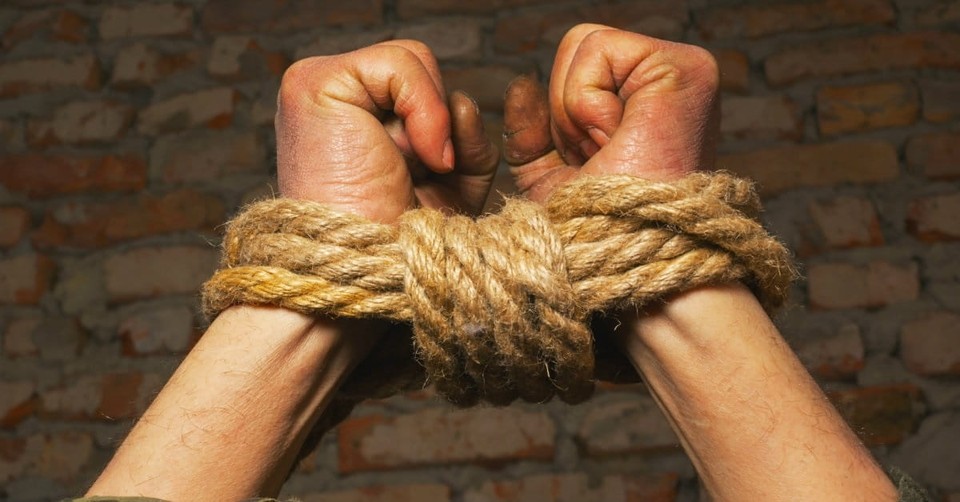Does the Bible Support Slavery?

“During that long period, the king of Egypt died. The Israelites groaned in their slavery and cried out, and their cry for help because of their slavery went up to God” (Exodus 2:23).
God rescued His people out of slavery in Egypt. His greatest command to us is to “love one another.” Though the Bible does not support it, God’s Word does illuminate how slavery could happen. The fall of humanity in the garden by the consumption of one forbidden apple (Genesis 3), set the rest of time on edge against sin.
Sin is the default that makes choosing the right thing so hard. Even when we know Christ and follow Him ardently, we do what we hate (Romans 7:15). It’s the curse we live in upon this earth, and the reason Jesus came here to make a way for us to be reconciled with God (John 3:16). Throughout the entire Old Testament, God constantly reminded His people to remember that He brought them out of the desert (Exodus 20:2; Deuteronomy 5:6).
God Tells Us Not to Judge or Enslave One Another
There are societal norms, like slavery was at one time, that we can convince ourselves are “okay”. Christians run the risk of living double-minded lives (James 1:8) when we neglect to consider how vast segregations in culture are possible. God specifically tells us not to judge each other (Matthew 7:1), much less make one a slave to the other.
God created us in His image (Genesis 1:27), but we are not Him. Jesus came to show us how to live (John 13:15) but we are incapable of doing the right thing without the abiding presence of the Holy Spirit (Romans 8:26). When we run rampant on this earth without His guidance, we leave ourselves defenseless against the evil that longs to take as many hearts down with him as he can before Christ comes back.
God Created Us Equal
God created us all equal (John 13:16). In His eyes, no man is perfect, lest we should boast (Ephesians 2:9). The glory of God is that He loves us through our mess, protecting both master and servant through His Word; proof that He does not abandon us, even when we turn on our heels and run the wrong way.
Evidence of grace can be found in the book of Philemon, a single chapter tucked into the rest of Paul’s letters. Believer to believer, he writes to Philemon concerning an escaped slave who had stolen from him. Onesimus had become a Christian.
This is how God works in, out, and around the imperfections of humanity. He doesn’t support our sinful nature, but He is compassionate towards us, using every life for His glory.
It made a difference to Philemon that Onesimus had become a Christian. Paul smartly reminded him in the beginning of the letter of his humble stature. Jesus called him straight out of persecuting Christians to follow Him (1 Corinthians 15:9). “If he has done you any wrong or owes you anything, charge it to me” (Philemon 18). That’s what Jesus did for us on the cross (Galatians 3:13). The story of Paul and Philemon extends a glimpse of our compassionate Father, wanting every heart to hear the gospel. That’s why He sent Jesus; we all get stuck in the ways of society. God warns us to have nothing to do with it (2 Timothy 3:5), but He doesn’t abandon us for our human imperfection.
God Doesn't Justify Our Sin, He Redeems
God’s not after perfection, but surely isn’t justifying our sin either. That’s why we need Jesus for salvation.
Don’t put it past Him to work a miracle through a fallen situation; to restore life to a dead place, or to save a heart that the rest of us deem unworthy and less than.
“Perhaps the reason he was separated from you for a little while was that you might have him back for good - no longer as a slave, but better than a slave, as a dear brother” (Philemon 15).
Some people are born into unfair circumstances. Others are brought into them under no control of their own. Slavery is an injustice, but God is just (James 5:7-9).
God’s people cried out to Him for help, and James urges us to pray when we are in need (James 5). Though God does not support slavery, or any other crime against humanity and His law to love each other as He has loved us, He does chase us down through our low moments to bring us to our knees … and home to Him.
Father, Praise You for making a way for us through Jesus Christ. Thank You for restoring us to Your presence through our acceptance of Him as our Savior. Father, forgive us for any injustice that we have laid upon another human being. We confess and repent any attitude of our hearts that tempts us to loft our own lives above any others in value or purpose. Bless all of those who suffer in slavery. We pray for the hope of freedom that only Christ can give. In Jesus’ Name, Amen.
Photo Credit: ©GettyImages/AndreyKrav
Originally published January 13, 2020.







